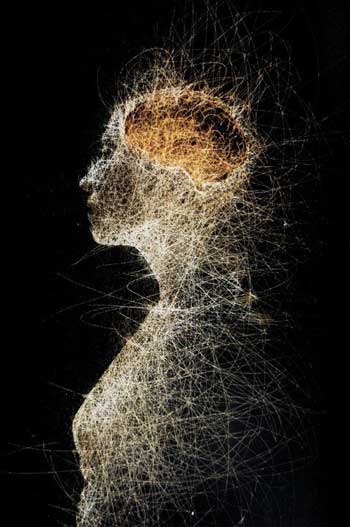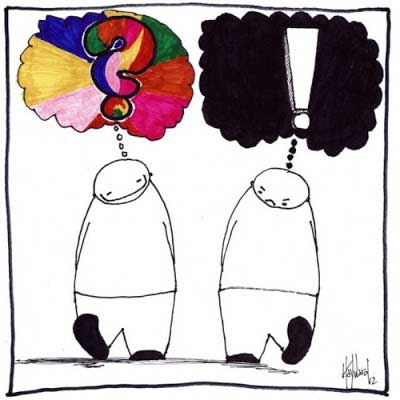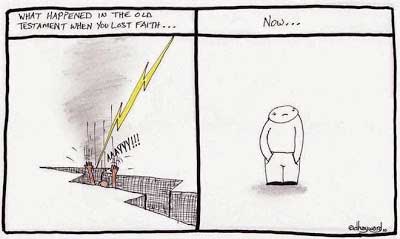
by Ed Babinski
1993 / January-February
originally for The Skeptical Review
Does the Bible or the witless Scarecrow in The Wizard of Oz mention the brain more frequently? If your answer was the scarecrow, you are right. The Bible mentions a number of key human organs, such as the heart, blood, bowels, liver, and kidneys, but never mentions the most important organ of all, the brain. This is not unusual, of course, unless you happen to view the Bible as an inspired scientific textbook, in which case it would appear to be missing a bit of vital information.
Of course, it is easy to see how a merely human observer could overlook the brain. It lies hidden behind a hard bony shell and, even when exposed, maintains a noiseless, placid appearance. Compare the heart, which beats faster in reaction to anger, love, joy, physical exertion, etc. Add to this the fact that the heart lies near the center of the body and you arrive at the ancient conception that it was the primary seat of oneʼs emotions, moral direction (or misdirection), and according to some, our decision making ability. Indeed, how could early human observers have avoided being impressed by the pounding heart and racing blood?
In similar fashion, the ancients were also impressed with the “breath”—breathing being an easily observable external trait associated closely with life, its speed and depth coinciding with oneʼs emotional and physical state. In fact, both the Hebrew and Greek words for breath were also used (in their respective languages) to refer to oneʼs soul or spirit.
Historians agree that hundreds or even thousands of years passed before the brain, rather than the heart, was recognized as the most important organ in the body. An ancient Egyptian surgical treatise [circa 3,000 B.C.] mentioned how head and neck injuries affected a personʼs speech and the use of his limbs. This seemed to surprise the author of the treatise, who repeated several times that “the injury was in the head.” Regardless of the implications of such observations, the Egyptians, along with the Mesopotamians and the ancient Greek poet Homer, continued to regard the heart as the primary organ of the soul that harbored intelligence and feeling. To prepare a pharaoh for mummification, his heart (and other organs of his torso) had to be embalmed and buried with him, but his brain was removed from his skull and thrown away. 1
Around 460-370 B.C., the ancient Greek philosopher Democritus contested the heart-centered views found in Homerʼs Iliad . Democritus wrote: “The brain watches over the upper limbs like a guard, as citadel of the body, consecrated to its protection,” adding, “the brain, guardian of thoughts or intelligence,” contains the principal “bonds of the soul.” However, he also called the heart “the queen, the nurse of anger” and believed that “the center of desire is in the liver.”
The Greek physician Hippocrates (a contemporary of Democritus) enlarged the new brain-centered theory with clinical observations. He wrote in The Sacred Disease, “Men ought to know that from the human brain and from the brain only arise our pleasures, joys, laughter, and jests as well as our sorrows, pains, griefs and tears…. It is the same thing which makes us mad or delirious, inspires us with dread and fear, whether by night or by day, brings us sleeplessness, inopportune mistakes, aimless anxieties, absent-mindedness and acts that are contrary to habit….” That the Hebrews took for granted that the “heart, bowels, and kidneys” were the seats of manʼs emotional and moral impulses would no doubt have raised a wry smile on Hippocratesʼ face. But that is to get ahead of ourselves.
Plato [428-348 B.C.] in his dialogue entitled Timaeus argued that the intellectual part of the soul was contained in the head. Then Aristotle [384-322 B.C.], Platoʼs student and successor, reverted to the heart-centered view of the soul. Aristotle observed the way that blood vessels from all over the body converged toward the heart and how the heart reacted visibly to being touched while the brain did not. Furthermore, the lower animals, like worms, insects, and shellfish, all had pulsating heartlike organs but lacked anything resembling the vertebrate brain. Lastly, Aristotle pointed out that a chickenʼs body exhibited a life of its own after being separated from the head. It was thus obvious to Aristotle that “the seat of the soul and the control of voluntary movement—in fact of nervous functions in general-are to be sought in the heart. The brain is an organ of minor importance, perhaps necessary to cool the blood” (De Motu Animalum).
Three hundred years later, the Roman philosopher Lucretius wrote in a similar Aristotelian vein, “The dominant force in the whole body is that guiding principle which we term mind or intellect. This is firmly lodged in the midregion of the breast. Here is the place where fear and alarm pulsate. Here is felt the caressing touch of joy. Here, then, is the seat of the intellect and mind” (On the Nature of Things, Book III, circa 55 B.C.).
But even though philosophers like Aristotle and Lucretius were heart-centered, the tradition of Greek physicians, beginning with Hippocrates, remained brain-centered. In the 3rd century B.C, Herophilus and Erasistratus dissected thousands of bodies and demonstrated that nerves were different from blood vessels and that they originated not in the heart, as Aristotle thought, but in the brain or the spinal cord. Then almost five hundred years after Herophilusʼ day, the Greek physician and philosopher Galen [130-200 A.D.] experimented and established brain physiology as a science. He demonstrated that the brain played the central role in controlling bodily and mental activity.
However, because of the influence of Aristotle on medieval scholars and the added bonus that his view of the primacy of the heart agreed more with biblical descriptions than brain-centered views, heart-centeredness survived until the 16th century. As Martin Luther, the father of protestantism, put it, “Faith is under the left nipple.” (According to “folk anatomy,” the heart lies under the left nipple.) Or notice the feeling of uncertainty voiced in Shakespeareʼs Merchant of Venice: “Tell me, where is fancy bred, in the heart, or in the head?” And in Balzacʼs “Heartaches of an English Cat,” the “aches” have nothing to do with heart disease. After the 1700ʼs, new figures of speech arose, based on an appreciation of the brainʼs central importance. Today we are more likely to warn someone not to “lose his head” rather than to be “strong of heart,” and we admire people with “brains.” Now compare the Bible. It was written at a time when Hippocrates and other Greek physicians knew better, but throughout the length and breadth of it, emotional and moral behaviors are related foremost to the heart, the bowels, and the kidneys, rather than to the brain.
Of course, the Bible speaks of the “head.” It is a place to be anointed and crowned and where the priests wore their miters (turbans), but such practices were shared by heart-centered cultures, so they cannot be used to support any theory that the authors of the Bible recognized the primary importance of the brain.
There is one verse in the Bible that has been cited as some form of recognition of the brain. Daniel 2:28 speaks of “visions of thy head upon thy bed.” Of course, even if this were an instance of brain-centeredness, it should be remembered that historical scholarship assigns the book of Daniel a date of composition later than any other book in the Old Testament. Also, the verse merely refers to “head-visions,” and it could be referring obliquely to the fact that oneʼs eyes are in oneʼs head or, perhaps, to the fact that one sees images/visions in his head. However, in neither case does that imply that what is in oneʼs head is anything more than a screen for visions to play themselves out upon. That hardly gives full recognition to what lies inside oneʼs head.
Of course, the Bible refers to the “mind.” However, aside from implying that the mind is not identical with the heart (cf. Mt. 22:37; Mk. 12:30; Lk. 10:27), the Bible does not go on to state where the seat of the mind is located. Neither are “mind” and head used in conjunction with one another. Other ancient cultures also referred to the mind without specifying to which organ it was related. It appears to have been an entity like the soul-breath, whose location was never specified. Nevertheless, certain organs, to them, seemed especially capable of influencing and directing oneʼs emotions and morality, and those were specified.
The ancients (including the Hebrews) all agreed that one such organ, the primary one, in fact, was the heart. They used the word heart repeatedly, attaching enormous emotional and moral significance to its behavior. The Bible emphasizes how the heart “deviseth a manʼs way,” “inspires speech” “believes,” “is joyful,” “is deceitful,” “is good” (Prov. 16:9 ; Mt. 12: 34 ; Rom. 10:10 ; 1 Chron. 16:10 ; Jer. 17:9 ; Lk. 6:45). This resembles what the ancient Egyptians, Babylonians, and Greeks (those Greeks who were not physicians, Homer and Aristotle) believed and taught. Besides the heart, the Bible also focuses (to a lesser extent) on the emotional and moral significance of the bowels and kidneys. Here are some of the verses in the King James Bible in which the Greek and Hebrew terms for bowels and kidneys are literally translated:
My bowels are troubled for him; I will surely have mercy upon him, saith the Lord (Jer. 31:20).
Be ye straitened [restrained] in your own bowels (2 Cor. 6:12).
I long after you in the bowels [affection] of Christ (Philip. 1:8).
(T)he bowels of the saints are refreshed…. (R)efresh my bowels in the Lord (Philemon 7:20).
(S)hutteth up his bowels of compassion (1 John 3:17).
Thus my heart was grieved, and I was pricked in my reins [Latin, renes, which means kidneys, a literal translation of the Hebrew] (Ps. 73:21).
My reins [kidneys] also instruct me in the night seasons (Ps. 16:7).
Oh let the wickedness of the wicked come to an end; but establish the just: for the righteous God trieth the heart and reins [kidneys] (Ps. 7:9).
Yea, my reins [kidneys] shall rejoice when my lips speak right things (Prov.
23:16).
I am He [God] which searcheth the reins [kidneys] and hearts (Rev. 2:23).
The Talmud (Berakhoth 61a) says that one kidney prompts man to do good, the other to do evil. The kidneys (among other organs, yet excluding the brain) were especially reserved for Yahweh and sacrificed to Him as a burnt offering (Lev. 3:4-5). Even if the Hebrews regarded this insight into the kidneys as “pure poetry” (which is doubtful, based on historical comparisons, and since figures of speech have to originate from ideas), it is a poetry that no longer survives or interests mankind. In fact, in the above verses the Hebrew word for kidneys has been translated soul in modern English Bibles to avoid cumbersome explanations of why the ancient Hebrews attributed moral significance to a personʼs kidneys.
Or consider the twin biblical notions that “the life is in the blood” and “without the shedding of blood there is no remission of sins” (Lev. 17:11-14 ; Heb. 9:22). Because of such ideas, the ancient Hebrews sacrificed in a bloody fashion many thousands of animals, and Christians came to view Jesusʼ “blood” sacrifice as necessary for the forgiveness of sins and the drinking of Jesusʼ “blood” (in symbolic and/or mystical fashion) as partaking of his “life.” This is in obvious contrast to scientific consensus, which agrees that human “life” is not primarily “in the blood” but in the brain and nervous system.
Indeed, oneʼs primary “life” ends with the total and permanent cessation of brain activity, even if no blood is shed in the process, as in cases of poisoning, asphyxiation, or electrocution. In fact, as the comedian Lenny Bruce used to jibe, “If Jesus had been executed in the twentieth century instead of the first, Christians would be wearing little electric chairs around their necks.” Maybe so, but if you were a fundamentalist Christian, I suppose there would still have to be a spear in the side of an electrocuted Jesus. Thereʼs gotta be some “blood” shed for forgiveness. (I am not seeking to mock religion but merely posing questions to those who claim the Bible can be interpreted both literally and scientifically.)
”Science” in biblical times was based on apparent , not literal, truths. The earth appeared to be the flat, firm foundation of creation. The heavens appeared to be stretched out above the earth like a tent or canopy. The heart, bowels, and kidneys (and not the brain) appeared to be intimately linked with oneʼs emotions, morality, and decision-making processes. Even ancient creation accounts (Egyptian, Sumerian, Babylonian, Hebrew, etc.) reflected this attitude toward “science.” They thought that God (or the gods) had created all of the animals and plants as they then appeared and that their offspring would not appear any different no matter how many generations should pass. Thus, for the ancient Hebrews, crude “scientific” theories, based on superficial appearances, dictated the Hebrew view of reality and their subsequent figures of speech.
According to an article in Psychology: A Journal of Human behavior, Warren Gorman and Lawrence Edwin Abt questioned 110 females between the ages of eighteen and twenty to determine the concepts they had of the form and function of their bodies. Their article “Is the Brain the Most Important Organ?” (Aug. 1964, pp. 2-11) contained some interesting questionnaire results. For instance, when asked, “In Children, what is the most important organ? In adults?… In old people?…” the subjects rated the heart the “most important organ” in old people and the sex organs the most important in adults, whereas in children they rated the brain, heart, and digestive organs as “equally important.” (Only five subjects out of 110 responded “brain, brain, brain” to the three parts of this question!)
When asked, “What is the most important function of the body?” the subjects answered “breathing,” with “circulation or heart function” next. These first two questions of the survey along with their replies demonstrate how easy it must have been for the ancients to have overlooked the primary importance of the brain. Even 20th century questionnaire respondents continue to overlook the primary importance of “brain function”! However, the response of the subjects to the next question left no doubt that a side gap exists between ancient and modern views of the brain. When asked, “What part or function of the body is most intimately lined with your emotions?” the brain easily achieved first place. Such a result demonstrates how deeply modern scientific knowledge has penetrated our culture and superseded heart/bowel/kidney-linked descriptions of human emotions found in the Bible and other ancient works. 2
ENDNOTES
[1] For much of the historical data on how the brain eventually came to be viewed as more central to oneʼs life and “soul” than the heart, I am endebted to Neuronal Man (New York: Random House, 1985), an English translation of Jean-Pierre Changeuxʼs book LʼHomme Neuronal.
[2] If the results of my inquiry into the question “Does the Bible Speak of the Brain?” are deemed unsatisfactory by those who adhere to the literal words of the Bible and if those same adherents should blame my “blasphemous” conclusions on my “hard heartedness” toward God, then I should like to reply in all sincerity and politeness that my heart is as “hard” as their heads are soft.





